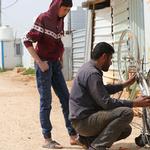TRAFIG: Creative solutions to the challenge of forced displacement
On December 17, the Compact on Refugees will – most likely – be adopted at the UN General Assembly. One of the central goals of the Compact on Refugees is to improve the protection and resilience of refugees and to enhance trust and cooperation between refugees and host communities. With the new research project TRAFIG, researchers from Europe, Africa and Asia, seek to contribute to finding solutions to protracted displacement.
The new EU-funded project TRAFIG (Transnational Figurations of Displacement) will start in January 2019. TRAFIG introduces a novel perspective by focusing on refugee’s connectivity and mobility as a part of the solution rather than part of the problem of protracted displacement situations.
Through comparative empirical research in refugee camps and cities in Asia, Africa, and Europe, TRAFIG will analyze why displaced people live in vulnerable situations in host countries, how they sustain their livelihoods as well as how policy and humanitarian practice can better support their self-reliance. The project team will also trace refugees’ networks of interaction and support beyond their place of living and ask how these transnational connections shape their current situation and their future mobility trajectories. Last but not least, it seeks to better understand the relations between refugees and host communities and investigates the medium and long-term economic impacts of displacement. This approach will provide academic evidence and more robust data on refugee movements and protracted displacement.
On the basis of its findings, the project will develop a rapid assessment tool in order to support policymakers and practitioners to enhance the self-reliance of displaced people as well as host-refugees relations through tailored programming and policy development.
The researchers aim to contribute to improving policies and humanitarian programs, hence making it easier to reach the goals of the Global Compact on Refugees. To ensure that they reach their goal, they will cooperate closely with key stakeholders throughout the entire life cycle of the project.
The European Commission funds the TRAFIG project within its Horizon2020 research program. BICC is coordinating the three year project. The partners in the research consortium are Addis Ababa University in Ethiopia, Aristotle University of Thessaloniki in Greece, the Bonn International Center for Conversion in Germany, Chr. Michelsen Institute (CMI) in Norway, International and European Forum on Migration (FIERI) in Italy, International Centre for Migration Policy Development (ICMPD) and Danube University Krems in Austria, Society for Human Rights and Prisoners' Aid (SHARP) in Pakistan, Sussex Centre for Migration Research in the United Kingdom, University of Leiden in the Netherlands, and Yarmouk University in Jordan.
Project


